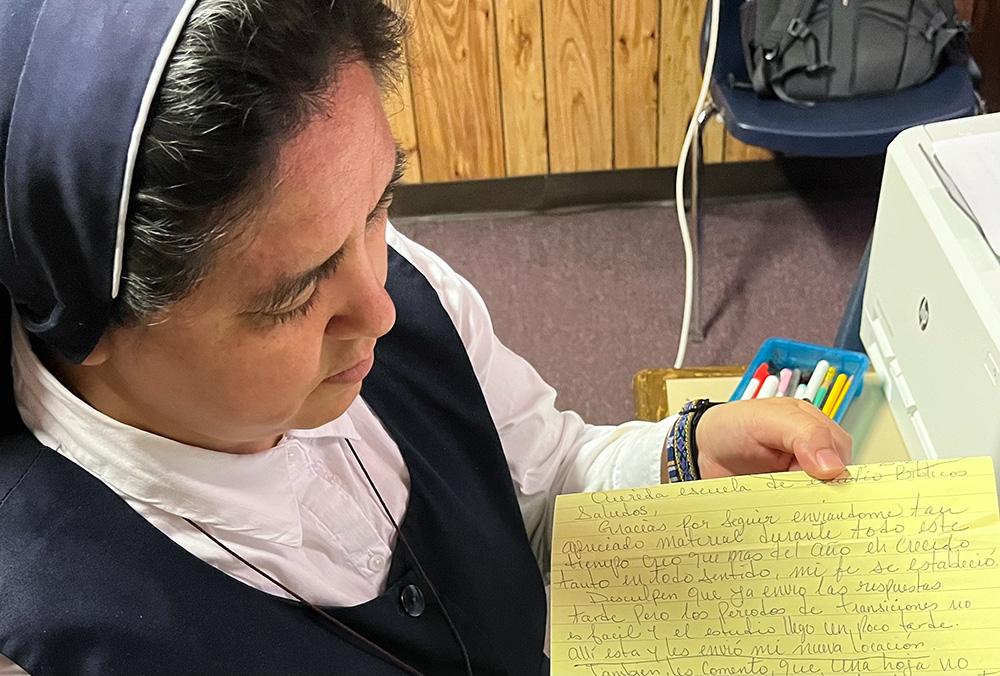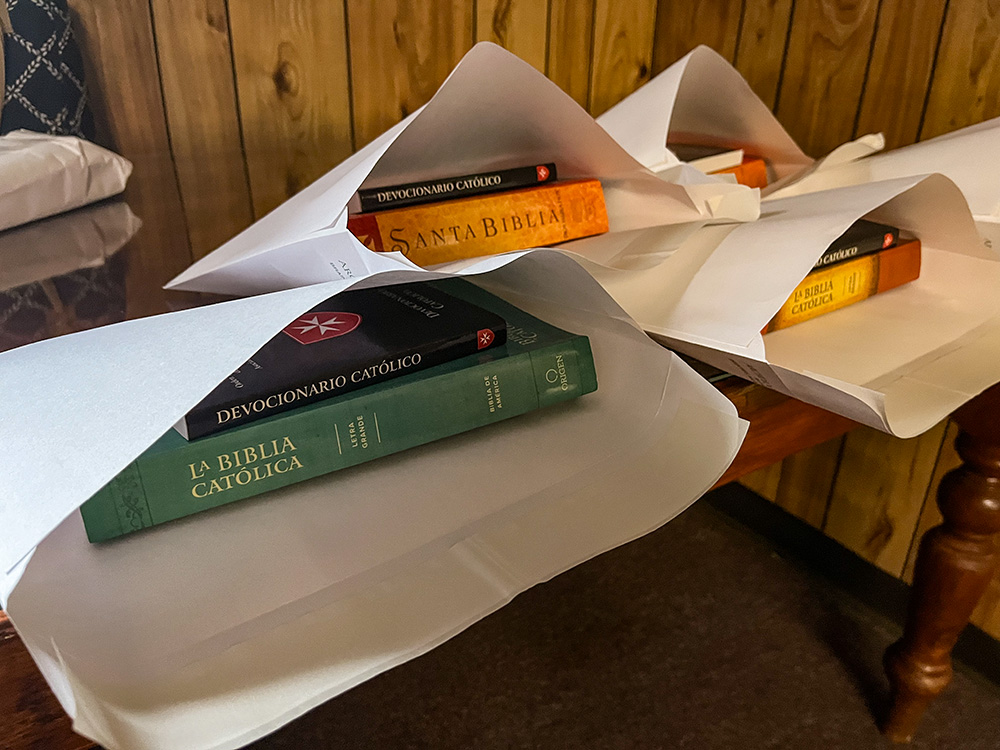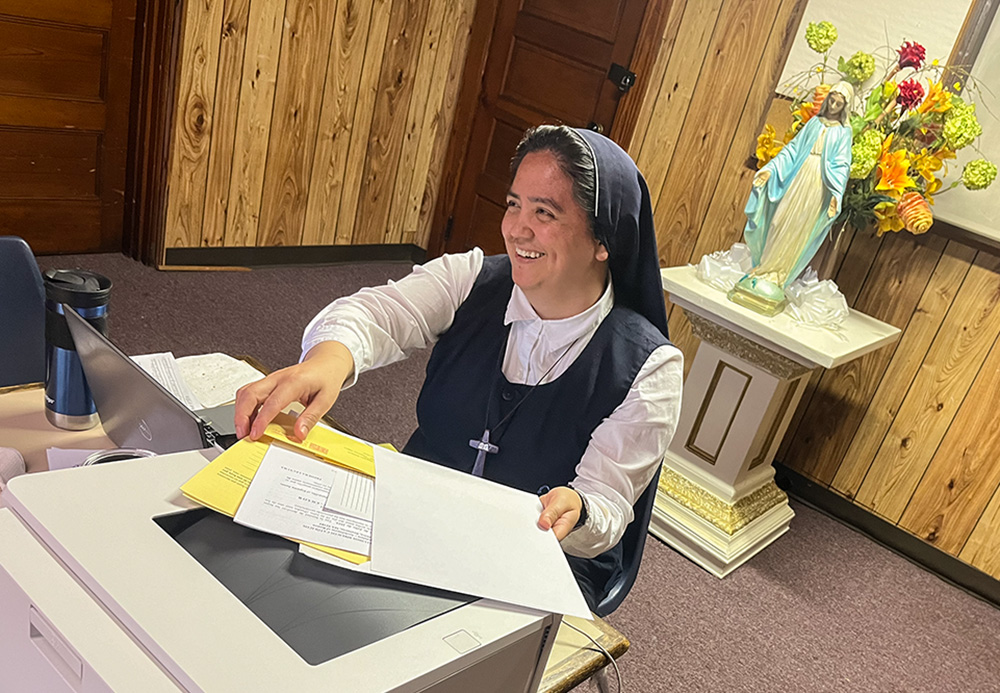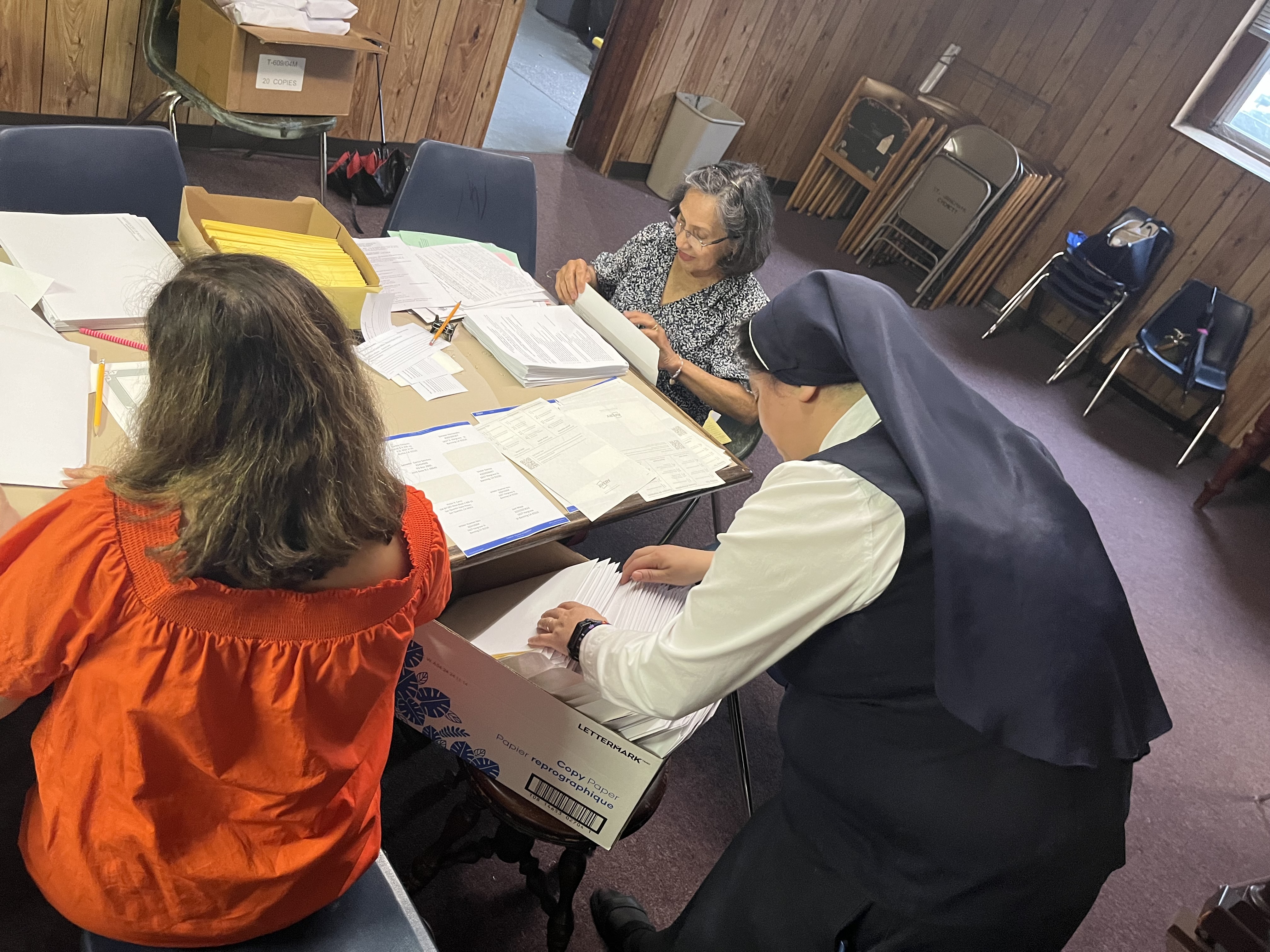
Missionary Servant of the Word Sr. Elsa Narváez Rodríguez shows an inmate's letter in which he thanks the team for the Bible study material and updates them with his new jail address. "During all this time, I have grown in every way, mi fe se estableció" — my faith was established, he wrote. (GSR photo/Luis Donaldo González)
When Sr. Elsa Narváez Rodríguez started working at the Boston Archdiocese seven years ago, she was surprised to receive some letters in Spanish from prisoners in different jails throughout the country, asking the Catholic Church to send them the word of God in their language.
"What has happened? We have not received the Bible study for a while," said one of the first letters Narváez Rodríguez read. "Por favor, necesitamos recibir la Palabra de Dios" — "Please, we need to receive the word of God."
Narváez Rodríguez, who is Mexican, belongs to the Missionary Servants of the Word and is currently serving as the evangelization consultant for Hispanic communities at the archdiocesan office for evangelization and multicultural ministry.
"How can I not respond to these brothers who want to encounter God?" Narváez Rodríguez told Global Sisters Report. "God is asking me to carry out this work of mercy."
Evangelization by mail in Massachusetts prisons began more than 25 years ago in Boston but was paused due to a lack of personnel. Since 2017, Narváez Rodríguez has restarted this ministry, for which she has organized a six-woman trusted team of volunteers who meet periodically in a parish in the city's northern area.
"It's very powerful to discover how these men are looking for God," Narváez Rodríguez said. "They are thirsty for God."
This project, Escuela de Estudio Bíblico or Bible Study School, offers inmates a Spanish program consisting of four modules of faith formation — a response to the lack of Spanish-language worship and materials inside the prisons. The prisoners deepen their knowledge of the Christian faith, the sacraments, apologetics and Scripture based on readings and mailed communications.

"In addition to the Archdiocese of Boston, we have received help from the Order of Malta, who donated Catholic Bibles and prayer books in Spanish for the prisoners," Sr. Elsa Narváez Rodríguez said. (GSR photo/Luis Donaldo González)
"During all this time, I have grown in every way; my faith was established," an inmate wrote in Spanish in one of the letters presented to GSR. "Thank you for continuing to send me such appreciated material."
Narváez Rodríguez and her fellow team's ministry is an effort to safeguard prisoners' civil right to exercise their religion freely.
"Under federal law, a prison or jail cannot substantially burden a prisoner's exercise of religion," said Jesuit Fr. George Williams, board chair of the Catholic Prison Ministries Coalition in the U.S., referring to the Religious Land Use and Institutionalized Persons Act passed in 2000.
Nowadays, the Escuela de Estudio Bíblico benefits almost 150 Hispanic inmates dispersed in different states, such as Massachusetts, New Jersey, Tennessee, Louisiana, California and Texas.
"We follow the strict regulations that each jail has," said volunteer María Eugenia Sánchez. "If we fail, they return the packages in their entirety." For example, "a single paper clip or staple can cause inmates to stop receiving the materials we prepare for them."
The national scope of this project is because prisoners are constantly being moved, Narváez Rodríguez said. "If their sentence is deportation, they are moved further and further south."
And their contact list is growing: "The inmates themselves are referring their fellows to join the program," she added.

Missionary Servant of the Word Sr. Elsa Narváez Rodríguez prepares mailings for the almost 150 inmates with whom she and her team from Escuela de Estudios Bíblicos share the Word of God. (GSR photo/Luis Donaldo González)
In response to the growing demand for applications, these women organized an external and highly confidential 20-layperson team dedicated to reading, reviewing and responding to inmates' correspondence.
"We respond to each letter personally," another female volunteer told GSR, requesting anonymity. "So, we know what is in the inmates' hearts," as they sometimes write about their personal situations.
Sánchez noted that carrying out this ministry by mail requires a huge financial effort. "Since February, we have been working to constitute the Escuela de Estudio Bíblico as an NGO [nongovernmental organization], able to receive donations and then reach more people," she said.
Carrying out this corporal work of mercy with the incarcerated is not easy, but the team makes it through each month with the help of the Boston Archdiocese, as well as the Order of Malta, which has donated Bibles and prayer books in Spanish for the prisoners.
"It is a work of mercy done with patience and faith," Narváez Rodríguez said.
Although other foundations in the country perform a similar ministry in English, Narváez Rodríguez and her team's primary goal is to continue offering the materials fully in Spanish and free of charge.

The Escuela de Estudio Bíblico team meets periodically in a parish in Boston's northern area. (GSR photo/Luis Donaldo González)
"Sometimes they can't attend Mass because in many places they only celebrate Mass in English," Sánchez said. "Many of them only have this material to encounter God."
Williams said this creative mail evangelization ministry is a great help because there are few Spanish speakers in Catholic prison ministry nationwide.
The ministry of evangelization by mail allows prisoners to express their heartfelt feelings and ask for spiritual support from the Catholic community, which provides pastoral service to them.
"I pray to God for my wife María and our children Ana and José, that the Lord will bless them wherever they are," wrote one of the prisoners in Spanish. "I also pray for all my fellow prisoners that the Lord will give us the strength we need."
According to Narváez Rodríguez, the inmates' main problems are loneliness, abandonment and distance from some families living in another country. Difficulties are made more significant by the hostile environment inmates experience in prisons.
"Prisons are traumatizing environments," Williams said. "People are exposed to violence, exploitation, intimidation and dehumanizing conditions daily."
Advertisement
"Our American prison system unfortunately reflects our society's choices," he added.
For the Escuela de Estudio Bíblico team, it is a great joy that many prisoners — inspired by these letters — get baptized, deepen their Catholic faith, and also become missionaries inside the prison.
"They become evangelizers," Sánchez said, despite Catholicism being a minority faith within U.S. prisons. "Our ministry goes beyond who receives the letters. They share the faith with their fellow inmates through reading circles, music and prayer."
As one inmate's letter from May stated, "You know I continue to teach the apostolic faith of our Lord Jesus Christ."
According to the volunteers' information, many prisoners continue to live their faith and do intense evangelization work once they are released.
"We have testimonies of people who continue to live their faith and mission in their local communities or homelands," Sánchez said. "They dedicate themselves to serving their parishes in different ministries."
According to Narváez Rodríguez and her fellow volunteers, they will continue to work in this ministry so that the inmates can continue to encounter God.
"We work to make them feel that they are not alone because our Lord is with them and accompanies them through the church," Narváez Rodríguez said.
"They are also part of the church."






